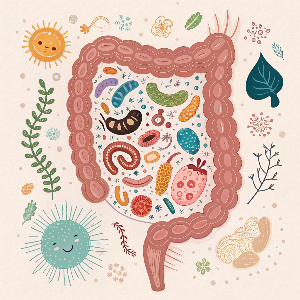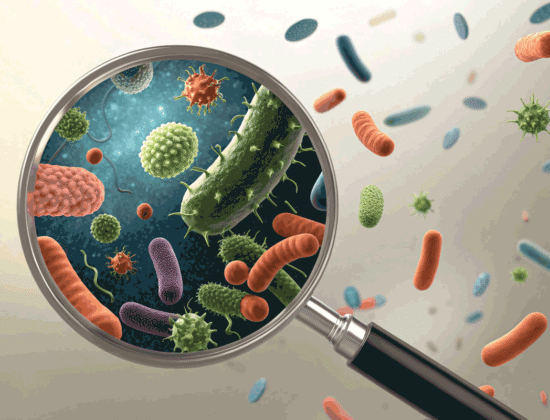You’ve probably heard the phrase “gut health” a lot lately—but what does it really mean? And what exactly is the gut microbiome?

In simple terms, your gut microbiome is made up of trillions of tiny living things—mostly bacteria—that live inside your digestive system. Most of them live in your large intestine, and together they form an entire ecosystem that plays a major role in your health.
These microbes are not just along for the ride. They help digest food, protect you from harmful germs, support your immune system, and even affect your mood. In fact, scientists now believe the gut microbiome is one of the most important parts of your body.
A Micro World Inside You
The human body contains more microbial cells than human cells. Most of them live in your gut, especially in the colon. This group of organisms includes bacteria, viruses (most harmless), fungi, and even tiny single-celled organisms called archaea.
Everyone’s microbiome is unique—kind of like a fingerprint. Your diet, lifestyle, environment, and even how you were born (C-section or vaginal delivery) can all affect the makeup of your gut microbiome.
What the Gut Microbiome Does
Let’s break down the most important jobs of your gut microbes:
1. Helping You Digest Food
There are many parts of food—like certain fibers and starches—that your own body can’t break down. Your gut microbes take care of that for you. They ferment these fibers into substances called short-chain fatty acids, which feed the cells in your gut lining and help reduce inflammation.
2. Making Nutrients
Some of the bacteria in your gut actually produce vitamins. These include:
- Vitamin B12
- Vitamin K2 (important for bone and heart health)
- Folate
- Biotin
This means your microbiome can affect how well you absorb nutrients from your food.
3. Training Your Immune System
Did you know that 70% of your immune system lives in your gut? Friendly microbes help “train” your immune cells to know the difference between a harmful invader and something harmless, like a piece of food or pollen.
People with an unbalanced gut microbiome—called dysbiosis—are more likely to have autoimmune issues, allergies, and frequent infections.
4. Protecting the Gut Barrier
Your gut lining is a thin wall that separates your digestive system from the rest of your body. Good bacteria help keep this barrier strong, which stops unwanted bacteria, toxins, or undigested food from leaking into your bloodstream—a problem often called “leaky gut.”
5. Influencing Your Brain
Here’s where things get really interesting. Your gut and brain are connected by something called the gut-brain axis. Gut microbes can produce neurotransmitters like serotonin and dopamine—the same chemicals that affect your mood.
Studies show that a healthy microbiome may help reduce symptoms of anxiety and depression. This is why many scientists now call the gut the “second brain.”
Why Fermented Foods Matter
One of the easiest ways to support your gut microbiome is by eating fermented foods. These are foods made through natural processes that involve beneficial bacteria or yeast. Examples include:
- Yogurt
- Kimchi
- Sauerkraut
- Kombucha
- Kefir
- Pickles (naturally fermented)
Fermented foods often contain live probiotics, which are helpful microbes that can support or restore your gut ecosystem. They’re not a cure-all, but they’re a powerful part of a healthy diet.
Signs Your Gut Microbiome Might Be Out of Balance
Here are a few signs that your gut might need more support:
- Frequent bloating, gas, or indigestion
- Constipation or diarrhea
- Skin issues like eczema or acne
- Low energy or frequent illness
- Brain fog or low mood
If you notice these issues regularly, it may help to add more fiber-rich and fermented foods to your diet—and to avoid overusing antibiotics, which can wipe out good bacteria.
The Bottom Line
Your gut microbiome is more than just a collection of bacteria. It’s a living, changing system that affects nearly every part of your health. Taking care of your gut—especially through a good diet—can lead to better digestion, stronger immunity, improved mood, and even clearer thinking.
Even small changes, like adding yogurt or sauerkraut to your meals, can make a difference over time.



